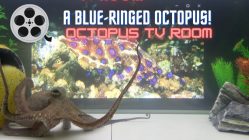The octopus can survive under extremely hard conditions and can adapt to otherwise hostile environments such as low temperatures and depths. A pale octopus, for example, was recently found living at more than two kilometers depth around hydro-thermal vents near Antarctica. However, experts are very skeptical as far as the existence of a freshwater octopus species is concerned. This is because in order to survive in freshwater, octopuses would have to develop a mechanism to help them cope with osmotic change in freshwater.
The Freshwater Octopus: Real or Yet Another Myth?
The freshwater octopus allegedly inhabits the rivers of North America. Testimonies of freshwater octopus date from as early as 1933 and according to them, the freshwater octopus is two to three feet long. Most of these testimonies have been discredited, but in 1999 a dead octopus was discovered on the bank of the Ohio River in the state of Indiana. This octopus belonged to one of the Atlantic species and its body was not in a state of decomposition. So the question was raised, is it possible that an octopus strayed as far as the Ohio State Park and survived so long in such a toxic environment? And if not, how did it end up there?
The Freshwater Octopus Theory
Up to now the fact that all cephalopods are strictly marine species has been taken for granted as their physiology simply prohibits their survival in low-saline environments. However, it is an intriguing thought to theorize that since the octopus is characterized by all these astounding abilities, there is no reason why they wouldn’t be able to evolve and adapt to freshwater conditions if they had an evolutionary reason to do so.
The more down-to-earth theory regarding the appearance of octopus in fresh waters is that as octopus is nowadays turning into a very popular pet animal, pet octopus owners have decided to release their octopus from the aquarium to some nearby river without being aware that this would be fateful for their beloved companions.
Science Says No Way!
As fun as theorizing about the evolution of a new octopus species can be, scientists put an end to it by explaining why the octopus cannot survive freshwater conditions.
Marine species need to conserve fresh water and at the same time expel salt. The octopus therefore pumps seawater through the gills and uses the kidneys to filter out fresh water from the ocean. The blood of the octopus doesn’t carry enough oxygen to increase blood pressure and transfer the blood to each muscle. That is why octopuses needed to evolve three hearts in order to increase the speed of their muscles. So it is impossible for an octopus to cope with the osmotic change in freshwater. They would have to alter their physiology completely, develop a sodium pump and a couple of extra hearts to provide all this extra oxygen needed to pump more blood around their bodies.
On the other hand, if you spend as much time observing the octopus as we do here at Octolab, you will certainly start believing that an octopus can make even the impossible seem possible!















